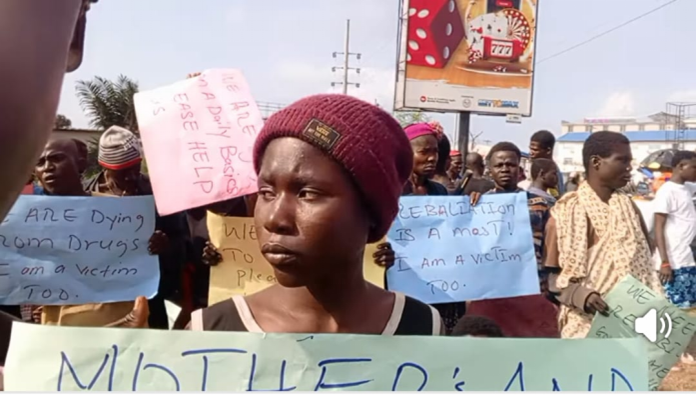The streets of Paynesville, Liberia, echoed with the desperate cries of hundreds of disadvantaged youths, known as “zogoes,” demanding government intervention to address the pervasive drug crisis gripping the nation. These marginalized youths, often victims of substance abuse, poverty, and societal neglect, marched from King Gray community, a notorious drug haven, to the Samuel K. Doe Sports Complex, their voices rising in a unified plea for help. Carrying placards bearing poignant messages such as “We’re dying from drugs” and “Rehabilitation is a must,” they highlighted the urgency of their situation and the government’s unfulfilled promises of rehabilitation and reintegration. The protest underscored the deep-seated frustration and desperation of a generation trapped in a cycle of addiction, seeking not just an escape from drugs but also a pathway back to a life of dignity and belonging.
The zogoes’ protest occurred against a backdrop of increasing public outcry and action against drug abuse in Liberia. Recent police raids, like the one in King Gray Graveyard, while aimed at curbing drug activities, have also sparked controversy. The forceful shaving of detainees’ hair, both male and female, raised serious concerns about human rights violations and the need for more humane policing strategies. Furthermore, community-led initiatives, such as the destruction of ghettos in Sinkor, Monrovia, demonstrate the growing public impatience with the drug problem, but also underscore the risk of vigilante justice and the importance of coordinated efforts with law enforcement. The zogoes’ demonstration adds a crucial dimension to this complex landscape, highlighting the often-overlooked perspective of those struggling with addiction.
A representative from the Ministry of Youth and Sports addressed the protesting youths, acknowledging the gravity of the drug crisis and the government’s commitment to tackling it. The official revealed the staggering statistic that over 100,000 young Liberians are affected by drug addiction, emphasizing the widespread nature of the problem and the need for comprehensive solutions. He assured the protesters that the ministry has a work plan in place to address the crisis and is dedicated to reaching out to those willing to undergo rehabilitation. This response, while offering a glimmer of hope, also highlights the immense challenge facing the government in effectively implementing its plans and ensuring that assistance reaches those who need it most. The protesters’ skepticism, born from past unfulfilled promises, underscores the need for concrete action and tangible results.
The zogoes’ protest represents a significant shift in the fight against drug abuse in Liberia. It marks a moment where the most vulnerable and often silenced victims of the crisis are stepping forward to demand not only an end to the drug trade but also access to rehabilitation and support. Their public plea emphasizes that the fight against drugs cannot be won solely through law enforcement and crackdowns, but must also prioritize the rehabilitation and reintegration of those struggling with addiction. This requires a multi-pronged approach that addresses the root causes of drug abuse, including poverty, lack of opportunity, and societal marginalization.
The protest also highlights the broader societal context within which the drug crisis unfolds. The recent “Say No to Drugs” campaign march and President Boakai’s unveiling of new anti-drug policies signal a growing national awareness and commitment to addressing the issue. However, the zogoes’ demonstration serves as a stark reminder that policies alone are insufficient. Effective implementation, coupled with adequate resources and a focus on rehabilitation, is crucial to making a real difference in the lives of those affected. The government’s call for citizens to report drug-related activities to the Liberia Drug Enforcement Agency also raises the important issue of community involvement and the need for collaboration between law enforcement and the public.
The zogoes’ protest is a powerful call to action, demanding that they be included, not ignored, in Liberia’s fight against drugs. Their message is clear: rehabilitation, not just punishment, is essential to breaking the cycle of addiction and poverty. The government’s response, while acknowledging the crisis, must translate into concrete action, providing the necessary resources and support for rehabilitation programs. Furthermore, the protest underscores the need for humane policing practices and a shift away from punitive measures towards a more compassionate approach that prioritizes the well-being and reintegration of those struggling with addiction. The zogoes’ courageous stand represents a critical turning point, offering an opportunity for Liberia to rethink its approach to drug abuse and embrace a more inclusive and effective strategy that prioritizes the rehabilitation and dignity of its most vulnerable citizens. Their voices must be heard, and their needs addressed, if Liberia is to truly overcome the devastating impact of the drug crisis.














